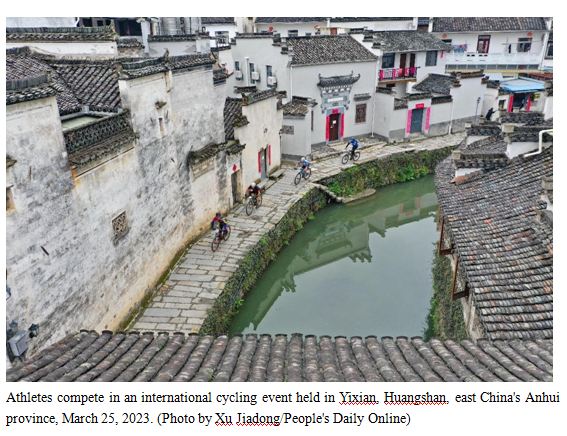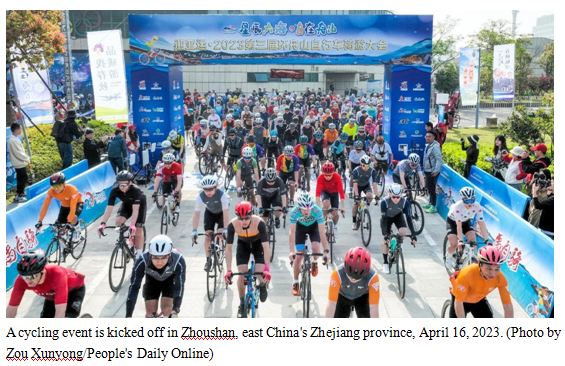By Wang Liang, Li Yang, People’s Daily
Cycling is just all the rage in China.
According to statistics released by the China Bicycle Association, the revenue of bicycle and electric bicycle manufacturers above designated size, or those with an annual business turnover of at least 20 million yuan ($2.88 million), increased 3 percent year on year to hit 210billion yuan. Their profit exceeded 10 billion yuan, up more than 20 percent from a year ago. Economic indicators of the industry are expected to keep recovering in 2023.
The bicycle boom drives rapid development of relevant industries, leads to secondary consumption, integrates the bicycle and other industries, and creates new jobs.
Li Gensheng is the manager of a bicycle store in Rizhao, east China’s Shandong province. He told People’s Daily that racing bicycles, also known as road bikes, are unquestionably the most popular type.
“New arrivals of this type are sold very soon,” he said.
This bicycle store started operation 10 years ago, and it was in the last year that Li began feeling that cycling has gone viral. According to the man, his store sold more than 1,500 bicycles in 2022, a historical high.
Li attributed the remarkable performance to a sound environment for cycling and adequate supporting facilities. Rizhao has opened two fitness trails totaling over 60 kilometers in the recent years, along which there are beautiful sceneries and 16 tourist sites and folk custom-themed tourism villages.
The optimization and expansion of the cycling environment are creating more consumption scenarios. China is home to a number of cycling routes, including traditional ones such as the loop line around the Qinghai Lake, the Qinghai-Tibet Highway and the Xinjiang-Tibet Highway. There are also emerging routes such as the one that encircles the elegantly beautiful Shangri-La, the one along the Hexi Corridor which presents the magnificence of the ancient Silk Road, the one along the Grand Canal that features a feast of both ancient and modern Chinese culture, and the one that circles Hainan province with refreshing seaside sceneries. These cycling routes are forcefully driving the development of regions along them.
As Chinese people are seeing higher living standards and pursuing healthier lifestyles, their demand for cycling equipment is moving toward the higher end, which contributes to the upgrading of the cycling industry.
Pardus, a bicycle manufacturer based in Laoling, east China’s Shandong province, has developed a racing bicycle that weighs only 5.8 kilograms.
“This is the lightest bike we have launched so far, which is as light as a bottle of peanut oil,” said Wang Chunqing, general manager of the company.
Weight is a key indicator of a racing bicycle’s performance. To make light bicycles, it calls for the application of new materials. It is learned that Pardus, as a leading player among specialized and sophisticated enterprises that produce new and unique products, owns 65 independently developed technologies regarding the manufacturing of wheels, frames and saddles.
“Our domestic sales doubled last year, and the orders we receive now have been scheduled to be produced at the end of this year,” Wang told People’s Daily, adding that the company has expanded its production line and launched intelligent manufacturing programs to better meet the demand of the market.
Luo Jie, vice president and general secretary of the China Sporting Goods Federation, noted that China’s optimizing cycling environment and increasing number of cycling events will benefit more enterprises.
Today, more and more places in China are willing to host cycling events. Huang Weisheng, who runs a sports company in Yixian county, east China’s Anhui province, explained the reason behind this with an example of the 18th China Huangshan (Yixian) International Cycling Open recently held in Yixian county.
Yixian, as a famous historical and cultural county, boasts rich tourism resources. It enjoys geographical advantages in hosting cycling events, and the cycling events in turn enrich the county’s tourism development and promote sports-tourism integration.
It is learned that the registration for the 18th China Huangshan (Yixian) International Cycling Open was full just hours after spots were open. According to Huang, the souvenir package offered for competitors in the event included not only cycling equipment, but also local specialties of Yixian. The organizer of the event established sales and exhibition areas for local farm produce and cultural heritage, Huang added. According to him, the county received over 6 million yuan of online orders during the cycling event.
A business structure centering on cycling events and covering culture, ecology, tourism and exhibition sectors has taken shape in Yixian county.
“Cycling and other outdoor sports can vitalize tourist attractions, B&B hotels and villages, and thus sectors with different economic features can complement each other, which expands market and helps meet the diverse demands of consumers,” said Wang Yuxiong, director of the China Center for Sport Industry Development Research, Central University of Finance and Economics.














